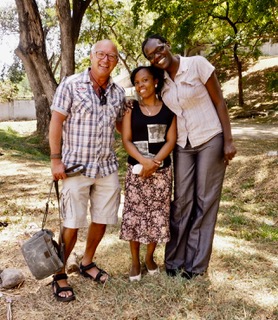Huib Jansen has been a sponsor for Friends for Life Foundation since 2014. He has a unique story as he personally knows the student he assists in Kenya. Together with Friends for Life he makes sure that this student, Millicent Musyoka, is provided with opportunities in education to build up a better future for herself and her family.
In an interview with Huib he tells his unique story:
Introduction
Huib was born on the 19th of May 1949 in Laren (North of Holland). Since 2006 he has lived together with his girlfriend Norma and her two daughters in Pijnacker. He worked for 26 in the educational sector, first as a gymnastics teacher and later as a teacher in medical subjects (anatomy, physiology and decease science) for nurses. In the meantime, he studied acupuncture and opened his own clinic 21 years ago. Officially he has retired but his clinic is still as busy as ever.
Huib traveled a lot in his life and still enjoys that. His passion is nature photography.
1. How did your link to Kenya start?
In 2003 I reacted to an advertisement of the Verkaart Development Team that was based in Kenya. They were looking for people with experience in education to support colleagues in Kenya with the development of new methods of teaching. The founder, Jan Verkaart, built 70 primary schools and 4 (later 5) boarding schools for girls secondary education in Kwale county. The experience exchange between the teachers was very open and fertile, for both parties and there was a lot of work to do.
In addition to education, there was also a need for information about health care, especially in relation to the prevention and eradication of malaria, information about AIDS, birth control and primary health care. In cooperation with the local authorities we made some big steps. We managed to develop seven medical clinics (dispensaries) coordinated by experts.
For this reason I embraced this adventure in Kenya: exchange of experiences, culture and knowledge. I enjoyed it a lot!
2. What are your experiences with education in Kenya and the chances young people get in this country?
I have the impression that education receives more and more priority in Kenya. In 2003 free primary education was introduced for all Kenyans which immediately had a an effect on the size of class . Classes with 80 pupils and one teacher was more the norm. There were extreme age discrepancies within a class. The quality of the education was strongly dependent on the motivation of the teachers and the head teachers. The influence of colonial England was clearly present.
A lot of children were expected to work within the household and on the land of their family in order to survive. Continuing education after primary school was (and often still is) not an option because of the expenses and the distance of the institutions. Education after secondary school, either on lower or higher level, is only affordable for the wealthier families. A lot of young talent is lost because of this, talent that Kenya needs lot. The economy is growing very fast, and the need for expertise is growing with that. The gap between poor and rich is growing growing larger!
3. Why did you choose to support a student on tertiary level in Kenya?
Through the Verkaart development Team I met an orphan, Millicent and I assisted her financially, during that period for 4 years. With that, she was able to finish her secondary school. After that however, there was no assistance for her anymore, not from the government or any other NGO. She was completely on her own. The diploma of secondary school was not sufficient for her to find a job and that iswhy she needed further education.
4. How did you get involved in Friends for Life?
I found Friends for Life after some research on the internet.
5. Why did you choose to support a student through Friends for Life?
I wanted Millicent to be guided by fellow Kenyans, who preferably have experience with children that come from poor backgrounds. The combination between Kenyan support and a familiar Dutch contact I have found within Friends for Life. The personal contact with Eefje (manager FFL) on top of that made the decision for me clear.
6. How do you see the future of the student that you support?
At this moment in time, Millicent is doing very well in her studies. I had the ability to meet the mentor and dean of the institution where she studies in person when last in Kenya. They know Millicent and showed her that they believe in her. And I also believe in her! In some time, she will have a job with an income with which she can support herself and become an independent, strong person. That is what it is al about for me!
7. What are according to you are the advantages or disadvantages of a programme in which a student support another student after they finish their studies by repaying their scholarship (student-for-a-student)?
To my opinion the concept of the student-for-a-student concept is sublime! The debt is being repaid and the commitment to others stays. This is of course wonderful from a social perspective!
8. What are the strong elements of the Friends for Life programme according to you?
In my opinion the strongest point of Friends for Life is that the organisation is very solid and strong. Working as an NGO in a country that is in development, only makes sense if you do this with a well thought plan, with a vision and knowledge about what you are doing. Of course aspects such as respect for another culture, patience, perseverance and ambition are important. But a recognisable organisation that stands for what it is doing is according to my pointt of view the most important. And that is the kind of organsiation that Friends for Life is!
9. What would you recommend to Friends for Life for further improvement?
Looking into the future for countries in development is always tricky. I understood from Eefje (manager FFL) that the board in Kenya has been renewed by enthusiastic board members and that their network is being expanded. This can only increase the effect of Friends for Life. The more poeple in poor areas get access to higher education, the more influence and power they will gain, the higher the chances that this will have a so called snowball effect (strange idea in Kenya!). Balancing old traditions with modern life will always remain a huge challenge!





